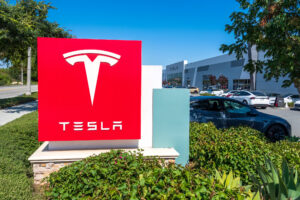
Tesla victorious in lawsuit accusing it of parts, repair monopoly
By onAnnouncements | Legal | Market Trends | Repair Operations
A U.S. district judge has dismissed a lawsuit against Tesla that alleged the automaker restricted its repairs and OEM-compatible parts because of the power it has in the U.S. electric vehicle (EV) market.
The anti-trust lawsuit was filed earlier this year by a group of Tesla owners who claimed they were compelled to pay “supracompetitive prices and suffer exorbitant wait times” to maintain and repair their vehicles.
However, this month the judge presiding over the matter, Trina L. Thompson, threw the case out after determining the plaintiffs lacked proof to back up their case under California’s Unfair Competition Law (UCL).
Tesla was accused in the lawsuit of violating rules under the anti-trust laws the Sherman Act, California Act, and the UCL.
The lawsuit alleged the automaker violated the Sherman Act by attempting to monopolize its repair services and OEM-compatible parts. Thompson noted that even though the plaintiffs were able to establish an aftermarket for EV parts, it wasn’t enough to sway the case.
“Here, Plaintiffs allege that the relevant markets are the aftermarkets for Tesla repair services and Tesla-compatible parts,” Thompson wrote. “The Court tentatively concludes that Plaintiffs properly allege an EV submarket. But because the Court would ultimately grant the motion to dismiss either way, at this stage of litigation, it assumes without deciding that Plaintiffs have alleged a cognizable submarket for EVs.”
The decision was made partly because the case failed to prove that the Tesla repair services market and the Tesla-compatible parts market are “cognizable” single-brand aftermarkets, Thompson said.
“The Court finds that Plaintiffs have not plausibly alleged a cause of action for monopolization, attempted monopolization or unlawful tying under the Sherman Act because they have not established that Tesla repair services and Tesla-compatible parts are relevant single-brand aftermarkets,” Thompson wrote in her order granting Tesla’s request for dismissal. “For the same reason, Plaintiffs have not plausibly alleged a cause of action for unlawful tying or combination in restraint of trade under the Cartwright Act.
“Since their UCL claims rely on their other claims, the Court finds that Plaintiffs have not plausibly alleged a cause of action under California’s UCL.”
Thompson cited a precedent that states, in order to establish a single-brand aftermarket, the plaintiff must demonstrate:
-
- “The challenged aftermarket restrictions are ‘not generally known’ when consumers make their foremarket purchase;
- “‘Significant’ information costs prevent accurate life-cycle pricing;
- “‘Significant’ monetary or non-monetary switching costs exist; and
- “General market-definition principles regarding cross-elasticity of demand do not undermine the proposed single-brand market.”
Thompson ruled that the plaintiffs failed to properly allege the first three requirements.
The lawsuit also claimed Tesla violated California’s Cartwright Act and UCL because its “unlawful tying arrangements restrain commerce and prevent market competition.”
Tesla called on the court to dismiss the Cartwright Act claims, arguing that the plaintiffs hadn’t alleged any relevant anti-trust markets. It said the lawsuit’s UCL claims should be rejected because they’re predicated on claims in the Sherman and Cartwright Acts, which also failed.
The court again sided with Tesla.
“The Court finds that Plaintiffs fail to state a claim for the Cartwright Act claims; that failure, in combination with their failure to state a claim under the Sherman Act and Magnuson-Moss Act, means their UCL claims fail as well,” Thompson wrote.
The case represented the second major legal victory for Tesla in recent weeks.
On Oct. 31, a jury sided with Tesla in a civil lawsuit that alleged the OEM’s Autopilot software was to blame for a fatal California crash.
The verdict, made in a Riverside County, California court, was the first time a U.S. jury trial determined whether the automaker’s driver assistance feature was responsible for a death.
Tesla’s software is the subject of numerous other lawsuits nationwide. The outcome of the latest trial has the potential to set a precedent regarding liability in future cases related to autonomous or semi-autonomous vehicles.
In this case, a lawsuit was filed by Lindsay Molander and her son Parker Austin, who were injured after a Model 3 driven by Micah Lee crashed into a tree after veering off a highway. Lee was killed after the car crashed and exploded into flames.
Images
Featured image courtesy of baileystock/iStock
